June 16, 2025 | 13:17 GMT +7
June 16, 2025 | 13:17 GMT +7
Hotline: 0913.378.918
June 16, 2025 | 13:17 GMT +7
Hotline: 0913.378.918
While garment companies are still struggling to find green and sustainable raw material areas to meet the needs of fastidious importing markets such as the Europe or Japan, Ecosoi - Silk Research, Production and Development Joint Stock Company has recently pioneered the exploitation of silk from pineapple leaves, turning agricultural waste into resources.
Vu Thi Lieu said: “It is fair to say that silk from pineapple leaves is superior to cotton, but there are also certain inferior aspects compared to hemp or silk. But this silk is environmentally friendly, easy to convince difficult customers. In the Europe, pineapple silk has long been used to make leather goods with very high prices. In Vietnam, Ecosoi, located in Hanh Phuc Agricultural Cooperative (Quynh Luu, Nghe An) is the first pineapple silk producer in 2021.
The potential for development is great because silk can be collected in industrial pineapples areas as well as organic pineapple areas. Any pineapple leaf over 60cm in length is eligible for processing, with the maximum length being 1 to 2 meters. The quality of pineapple silk in Thanh Hoa and Nghe An is better compared to that in Southern provinces, possibly due to the climatic conditions as well as the cultivation methods,. As a result, the pineapple leaves are thicker, longer and more appealing. On average, 55kg of pineapple leaves can produce 1kg of silk. Depending on the quality, the silk is purchased for 150,000 to 160,000 VND/kg, 2 times higher than cotton silk.

The model wears Ecosoi's pineapple silk woven outfit. Photo: Provided.
Pineapple silk can be made into cloth, bags or be sewn into clothes. The dress on display at the Swiss sustainable fashion product exhibition costs 5 to 6 million VND. We have also recently sent our towels to the Miss Peace Vietnam contest and we were selected by the Organizing Committee because in addition to the use value, the environmental value, our products also have a humanitarian value because the silk is spun by children with disabilities, and the weaving is done by traditional craft villages in danger of disappearing.
We currently produce 2 to 3 tons of silk a month, all of which is exported to the UK, the Philippines, Japan. We aim to reach 7 to 8 tons per month in 2023. There pineapple growing areas all across Vietnam, so raw materials and input are readily available. In addition to export, pineapple silk can also partially meet the needs of Vietnam's textile and garment industry. Pineapple leaves are difficult to decompose because they contain a lot of cellulose, so farmers often mill and then burn the leaves; some farmers even spray herbicides to dry the leaves quickly for burning. But when the leaves are put into processing, it is the silk product that the world market needs. We follow the model of taking the company as the center, and linking with satellites including farmer groups, cooperatives that grow pineapples. The company then transfers technology to these farmers and purchase their products afterwards. The most basic machines that farmers can buy to separate silk, comb, and whip cost approximately 40 million VND each.
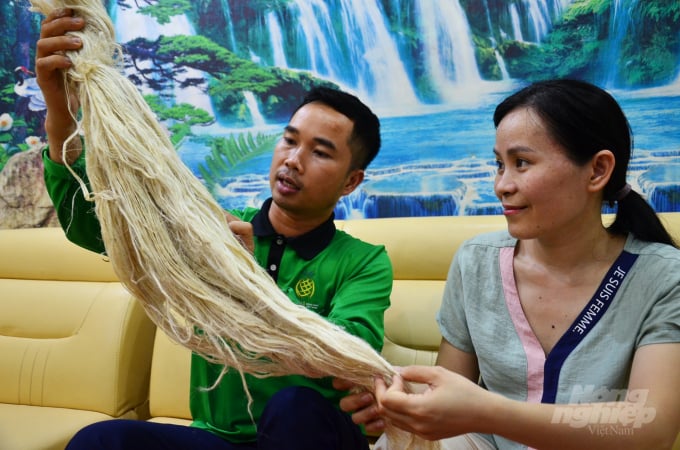
Nguyen Van Hanh and Vu Thi Lieu - co-founders of Ecosoi looking at pineapple silk samples. Photo: Duong Dinh Tuong.
I knew Hanh - the man who grows Hanh Phuc pineapples by chance through an acquaintance and he sent me a box of pineapples. When I peeled and ate one, the pineapple seemed to contain the golden sunshine, the fragrance and the sweet honey unique to the land of Nghe An. It's delicious because of the affection from a complete stranger. It is even more delicious because the pineapple is grown in a safe manner. I have been a journalist for many years and I was introduced to many areas of clean vegetables, clean chickens, clean fish, clean fruits, but I rarely see a clean pineapple area without using stimulants and herbicides.
Out of curiosity for these delicious pineapples, I met Hanh at the first Green Market in Hanoi. Unexpectedly, the man was formerly a ship captain. He was only allowed few days off every month, and unlike many of his colleagues whom went to karaoke and drink when the ship docked, he often visited farms in the area to learn more about clean agriculture.
Hanh's father died when he was 3 years old. In 2015, when he saw that his mother was old and weak, he decided to return to farming to take care of the family. But he did not follow conventional farming methods; instead, he opted for clean and safe farming because when he participated in charity activities, he visited Ho Chi Minh City Oncology Hospital and found it filled with patients and he suddenly thought of the main cause of the ailment: dirty products. He initially chose to grow native crops such as peanuts and beans to produce seasonally rather than off-season because, he believed that cultivation is similar to childbirth, and premature birth would mean sick children.
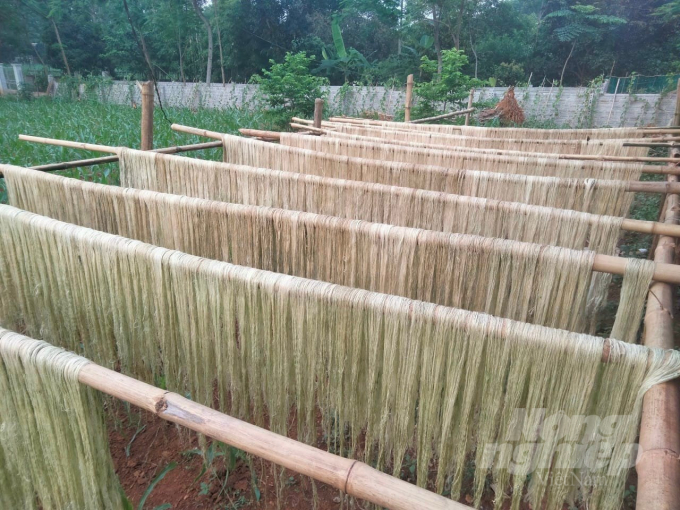
Drying pineapple silk. Photo: Provided.
As a farmer in Dien Hoang commune (Dien Chau, Nghe An), and on a visit to his cousin in Tan Thang commune (Quynh Luu) living 28km away, Hanh decided to start his career in the land that used to be Ben Nghe farm, with high hills and the burning sun. Local farmers grow pineapples following a conventional method, which means that there are still households who use herbicides, stimulants, growth stimulants; poisoning themselves in the process and sometimes they do not even dare to let their children eat the produce. The pineapples sold to traders are occasionally dumped because they could not be sold; and this saddened Hanh greatly.
People can grow pineapple in a safe way, but they find it difficult to sell because the trader's requirements are beautiful appearance, large fruit, glossy skin, green when harvested, harvest must be en masse, and cheap prices. In 2015, he bought 2.7 hectares of hills and then improved the soil by milling both the stem and the fruit; he also sprayed micro-organisms to treat fungus, then started planting pineapples, fertilizing with manure and fish compost. Pineapples grown industrially can be harvested after 12 to 14 months, but organic pineapples require 18 months of cultivation. As a result, conventional farmers can harvest up to 30-35 tons per hectare, and Hanh could only harvest less than half of that amount. He brought the pineapples home to offer to his ancestors, and invited his mother to enjoy it. A nostalgic feeling came rushing back, when each family planted a few pineapple trees in their own gardens for enjoyment, the fruits were small but the smell was special, sweet, and natural.
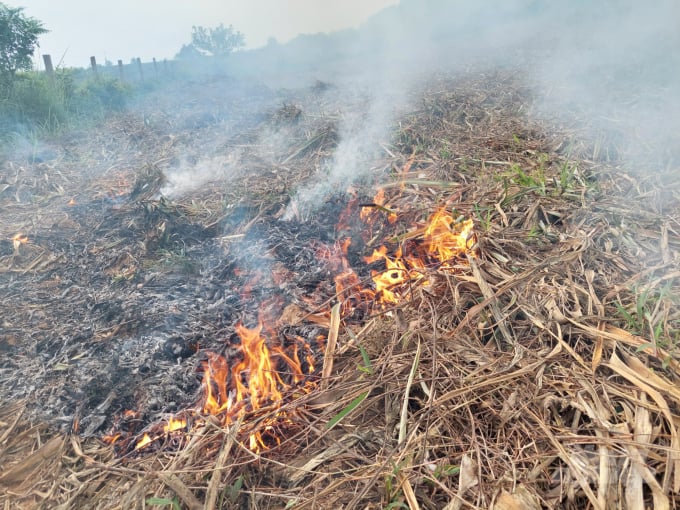
If not processed, pineapple leaves are often burned like this. Photo: Provided.
The produced pineapples are delicious but trading them was very difficult initially. Sometimes, at 9 to 10 at night, he drove to the intersection at 36 Hoang Mai, more than 10km from the farm to ship out but his pineapples were rejected because the shipping trucks were full; he then had to drive back home at 1 to 2 in the morning. The saddest thing is that when there is a large order, he would run out of products, and when there are products in abundance, demand is low because it is the pineapple season and the average price is much lower, while Hanh's pineapple only sells at a fixed rate.
There were times when his mother would break down crying when she saw her son working laboriously; because as a captain, Hanh received rice, water, and a high salary while as a hard-working farmer, he had to work tirelessly to make up for losses; take care of workers' rent; and when it's the pineapple he had to put in a lot of effort to cultivate, to process, to do paperworks related to food safety and hygiene. After drying, if pineapples cannot be sold immediately, he has to wait until the end of fresh pineapple crop, the cold season arrives.
Hanh comforted her mother by saying: “You have raised 5 children, no matter how hard the labor is, I am happy to be with my mother when I come home (about 28km back and forth). Later, when I make a fortune, but you're gone, I wouldn't be able to buy you back?". With love for her son, Hanh's mother left home to go to the countryside with him. In 2019 she passed away. Over 7 months from the moment she was diagnosed with the disease, Hanh took care of his mother from feeding to holding, bathing without question.
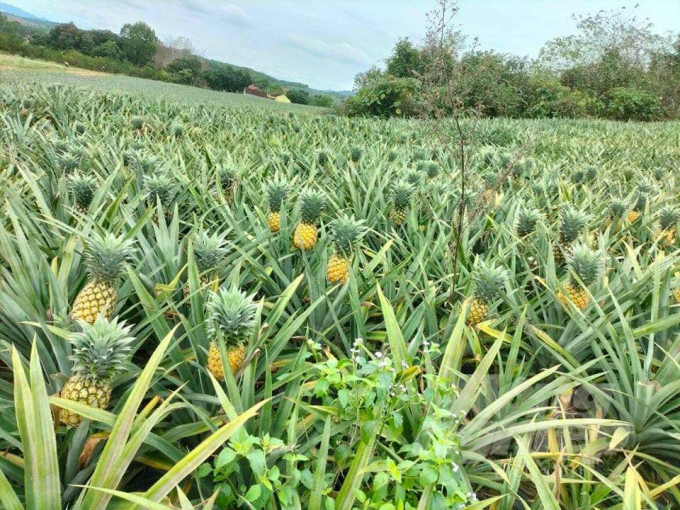
Pineapple hill planted in natural harmony in Hanh Phuc Agricultural Cooperative. Photo: Provided.
Farming cannot be rushed and profits are not instant, but in return, there are many like-minded farmers, creating an ecosystem from the North to the South with many clean products, gathering together through peaceful and green markets fairs.
When working with other farmers, Hanh often advises them to gradually switch to safe, then to organic farming, but not immediately because they will be overwhelmed. In order to convince many farmers to follow him, he has to pay all expenses from soil and water testing to technical training on IMO, manure, bio-pesticide, procurement of tools, setting up a processing factory. Hanh Phuc Agricultural Cooperative, led by Hanh, currently has 10 members with a total area of 40ha.
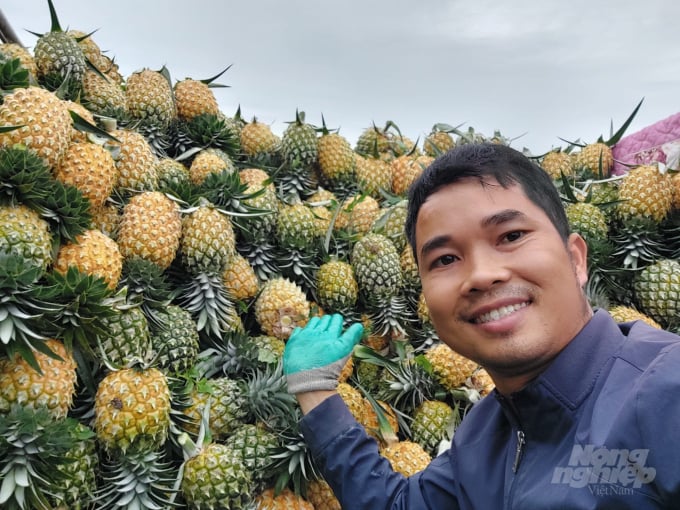
Nguyen Van Hanh, Director of Hanh Phuc Agricultural Cooperative. Photo: Provided.
"Why is it called Hanh Phuc Pineapple?" - I asked. Hanh replied: “It is because no harmful chemicals were used in the farming process, ensuring the health of farmers, making clean products to ensure the health of consumers. And having healthy life is having happiness. I'm most concerned when farmers use Chinese banned chemicals to stimulate the pineapples' growth because many factories require the pineapple to be even for quicker stamping, forcing farmers to comply.
To make a clean pineapple, it is necessary to establish a brand, have a separate dossier for each customer, or depend on the trader. Although this type of farming takes a lot of work, the selling price is higher than the price of industrially grown pineapple (10,000 VND/kg compared to 3,000 - 5,000 VND/kg). Some households plan to split up and start a business of their own this year. I am happy without fear of competition because my members have stood up for themselves, built a brand, provided a variety of products, and so many people in society will benefit from them"
While engrossed in farming, it was pineapple that helped Hanh with his destiny. His wife is an agricultural engineer and a member of the Tu Te Agriculture Alliance. While working on a forest project in Kien Giang, they met and traveled thousands of kilometers to join one another. Earlier this year, they gave birth a lovely baby.
Translated by Nguyen Hai Long
![Turning wind and rain into action: [4] Bringing climate bulletins to remote and isolated areas](https://t.ex-cdn.com/nongnghiepmoitruong.vn/608w/files/linhnhp/2025/06/14/1152-z6704423696987_15fd32ffc26d590d204d520c9dac6786-nongnghiep-151141.jpg)
(VAN) The Vietnam Agriculture and Nature Newspaper interviewed Mr. Vu Thai Truong, Acting Head of Climate Change and Environment at UNDP Vietnam, to gain deeper insight into how climate bulletins are delivered to farmers.

(VAN) In Tien Giang, a high-tech shrimp farm has developed a distinctive energy-saving farming model that has yielded promising results.
![Turning wind and rain into action: [3] 300.000 farmers benefit from agro-climatic bulletins](https://t.ex-cdn.com/nongnghiepmoitruong.vn/608w/files/news/2025/06/12/e5a48259d6a262fc3bb3-nongnghiep-125122.jpg)
(VAN) The agro-climatic bulletin has become a valuable tool for farmers in the Mekong Delta. After more than five years of implementation, the initiative is gradually being expanded nationwide.
![Turning wind and rain into action: [2] Providing forecasts to the people](https://t.ex-cdn.com/nongnghiepmoitruong.vn/608w/files/news/2025/06/12/e5a48259d6a262fc3bb3-nongnghiep-103927.jpg)
(VAN) In addition to improving the quality of hydrometeorological forecasts, putting forecast bulletins into practical use is crucial for production and disaster prevention.

(VAN) Blue carbon is receiving attention for its rapid absorption capacity and vast potential. It represents a promising nature-based solution to respond to climate change.
/2025/06/11/3507-1-161904_583.jpg)
(VAN) Seagrass beds and coral reefs serve as 'cradles' that nurture life in the ocean depths, creating rich aquatic resources in Vietnamese waters.
![Turning wind and rain into action: [1] Forecasting for farmers](https://t.ex-cdn.com/nongnghiepmoitruong.vn/608w/files/news/2025/06/11/e5a48259d6a262fc3bb3-nongnghiep-111919.jpg)
(VAN) Weather is no longer just a matter of fate. Forecasts have now become an essential companion for farmers in every crop season.